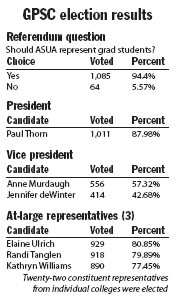An overwhelming majority of graduate and professional students voted to no longer be represented by ASUA, declaring they would be better represented by an autonomous graduate student government.
The Graduate and Professional Student Council elections held last week saw a record turnout of 1,167 graduate students, up from last year’s then-record turnout of 644 ballots cast, said GPSC Elections Director Amanda Brobbel in an e-mail statement.
“”I take it that many grad students came out specifically to vote on the referendum question that was on the ballot,”” Brobbel said.
The referendum stated: “”Should University of Arizona graduate students be represented by the GPSC and not be represented by ASUA?”” and 94.4 percent, 1,085 students, voted yes.
Paul Thorn, who ran unopposed and received 1,011 votes, will be the new president of the GPSC.
The vice presidency, one of the few contested positions in the GPSC election, went to Anne Muraugh with 57.32 percent of the vote.
Thorn said the results of the referendum are a graduate student mandate to the Associated Students of the University of Arizona and should be acknowledged.
“”I don’t see a lot of legitimacy in them claiming they represent graduate students when graduate students clearly don’t want to be represented by them,”” said Thorn, who is GPSC external affairs vice president. “”This shows that graduate students don’t feel they are represented by them, and ASUA should respect that.””
ASUA acting President Erin Hertzog said ASUA viewed the results as a survey because GPSC doesn’t have the power to hold a student referendum and criticized GPSC of launching a negative campaign after ASUA was trying to compromise with them.
“”They launched a campaign that was very biased toward GPSC, handing out posters and sending e-mails with inaccurate information,”” Hertzog said. “”You can’t administer a survey and have all your documents saying why you should vote one way and not the other.””
Under the current structure, there’s a graduate student council representing graduate concerns and a larger student government encompassing all students, Thorn said.
“”To have an undergraduate governing body trying to represent everyone, but sitting hierarchically above the graduate representation is taking advocacy away from graduates,”” Thorn said.
GPSC President Elaine Ulrich said Arizona State University’s student government had a similar structure as the UA’s until three years ago, when they divided graduate and undergraduate representation.
“”Essentially they’re separate and they have a joint programming and activities board. It’s really improved things for graduates,”” said Ulrich, who was elected along with Randi Tanglen and Kathryn Williams as one of next year’s three ‘at-large representatives,’ the group that represents the graduate student body, as opposed to those in a specific college.
Hertzog said in studies of colleges with separate governments the structure has proved more harmful than helpful.
“”At ASU, where they have two separate student governments, they view each other as competition. They competed over which population could get to the administration first and both populations ended up not benefiting,”” Hertzog said. “”Any time you have two populations taking two stances on everything, it’s not going to be as strong as one student voice.””
At last week’s ASUA senate meeting, Hertzog expressed interest in allowing graduate students to run for the senate and vote in at-large ASUA elections, which hasn’t been done since GPSC was formed in 1990, Thorn said.
“”Even if graduate students ran and were elected, they still wouldn’t be able to adequately represent all grads,”” he said. “”They’d just be out-voted all the time.””
Graduate students are pushing for separation from ASUA rather than further integration because graduate and undergraduate students face different campus issues, such as university employment, Thorn said.
Ulrich said it would be a conflict of interest to have graduates represented by a governing body so focused on undergraduates.
“”There’s a reason students don’t represent faculty, and graduate students need that same degree of autonomy,”” Ulrich said.
She said that integration wouldn’t be successful because it would only serve to dilute graduate student voice.
“”The senate, the president and the executive vice president, they do an excellent job of representing undergraduate students,”” Ulrich said. “”What would be great is if they responded to their constituents and said, ‘We need to just take a step back and do the right thing.'””
“”I hope they step up and feel it’s necessary to show they have accountability. I think that would show they have true leadership skills,”” Ulrich said.









